|
|
|
Sort Order |
|
|
|
Items / Page
|
|
|
|
|
|
|
| Srl | Item |
| 1 |
ID:
121399
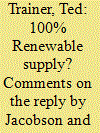

|
|
|
|
|
| Publication |
2013.
|
| Summary/Abstract |
I recently criticised the claim by Jacobson and Delucchi that renewable energy sources could meet world energy demand. Jacobson and Delucchi replied defending their position. This is a response to the main points made in that reply. The main issues are to do with intermittency of renewable energy sources and the implications for redundant plant and storage, vehicle to grid systems as a storage solution, the embodied energy costs of renewable energy, and overall system capital costs. It is argued that Jacobson and Delucchi do not provide satisfactory analyses of these issues and that they do not show that energy supply can be 100% renewable. This discussion is intended to clarify some of the core issues in the debate about the limits of renewable energy.
|
|
|
|
|
|
|
|
|
|
|
|
|
|
|
|
| 2 |
ID:
116716


|
|
|
|
|
| Publication |
2012.
|
| Summary/Abstract |
The current discussion of climate change and energy problems is generally based on the assumption that technical solutions are possible and that the task is essentially to determine the most effective ways. This view relies heavily on the expectation that renewable energy sources can be substituted for fossil fuels. Australia is more favourably situated regarding renewable sources than almost any other country. This discussion attempts to estimate the investment cost that would be involved in deriving Australia's total energy supply from renewable sources. When provision is made for intermittency and plant redundancy it is concluded that the total investment cost is likely to be unaffordable.
|
|
|
|
|
|
|
|
|
|
|
|
|
|
|
|
| 3 |
ID:
126567
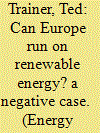

|
|
|
|
|
| Publication |
2013.
|
| Summary/Abstract |
The possibility of 100% renewable supply of European energy is analysed in terms of the amount of redundant plant required to cope with the intermittency of wind and solar energy, and the limited biomass potential. It is concluded that the capital cost would be unaffordable, and that biomass resources are insufficient.
|
|
|
|
|
|
|
|
|
|
|
|
|
|
|
|
| 4 |
ID:
097251
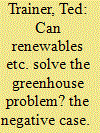

|
|
|
|
|
| Publication |
2010.
|
| Summary/Abstract |
Virtually all current discussion of climate change and energy problems proceeds on the assumption that technical solutions are possible within basically affluent-consumer societies. There is however a substantial case that this assumption is mistaken. This case derives from a consideration of the scale of the tasks and of the limits of non-carbon energy sources, focusing especially on the need for redundant capacity in winter. The first line of argument is to do with the extremely high capital cost of the supply system that would be required, and the second is to do with the problems set by the intermittency of renewable sources. It is concluded that the general climate change and energy problem cannot be solved without large scale reductions in rates of economic production and consumption, and therefore without transition to fundamentally different social structures and systems.
|
|
|
|
|
|
|
|
|
|
|
|
|
|
|
|
| 5 |
ID:
110437


|
|
|
|
|
| Publication |
2011.
|
| Summary/Abstract |
This article challenges the notion that energy efficiency and 'clean' energy technologies can deliver sufficient degrees of climate change mitigation. By six arguments not widely recognized in the climate policy arena, we argue that unrealistic technology optimism exists in current climate change mitigation assessments, and, consequently, world energy and climate policy. The overarching theme of the arguments is that incomplete knowledge of indirect effects, and neglect of interactions between parts of physical and social sub-systems, systematically leads to overly optimistic assessments. Society must likely seek deeper changes in social and economic structures to preserve the climatic conditions to which the human civilization is adapted. We call for priority to be given to research evaluating aspects of mitigation in a broad, system-wide perspective.
|
|
|
|
|
|
|
|
|
|
|
|
|
|
|
|
| 6 |
ID:
112330


|
|
|
|
|
| Publication |
2012.
|
| Summary/Abstract |
Jacobson and Delucchi have recently put forward a detailed case in support of the claim that renewable energy sources can meet total world energy demand. The following argument is that this proposal is unsatisfactory, primarily because it does not deal effectively with the problems set by the variability of renewable energy sources, and also because its analysis of investment costs is inadequate.
|
|
|
|
|
|
|
|
|
|
|
|
|
|
|
|
| 7 |
ID:
126820


|
|
|
|
|
| Publication |
2014.
|
| Summary/Abstract |
All forms of economic production and exchange involve the use of energy directly and in the transformation of materials. Until recently, cheap and seemingly limitless fossil energy has allowed most of society to ignore the importance of contributions to the economic process from the biophysical world as well as the potential limits to growth. This paper centers on assessing the energy costs of modern day society and its relation to GDP. Our most important focus is the characteristics of our major energy sources including each fuel's energy return on investment (EROI). The EROI of our most important fuels is declining and most renewable and non-conventional energy alternatives have substantially lower EROI values than traditional conventional fossil fuels. At the societal level, declining EROI means that an increasing proportion of energy output and economic activity must be diverted to attaining the energy needed to run an economy, leaving less discretionary funds available for "non-essential" purchases which often drive growth. The declining EROI of traditional fossil fuel energy sources and the effect of that on the world economy are likely to result in a myriad of consequences, most of which will not be perceived as good.
|
|
|
|
|
|
|
|
|
|
|
|
|
|
|
|
| 8 |
ID:
126588


|
|
|
|
|
| Publication |
2013.
|
| Summary/Abstract |
Hourly DNI data from the Australian Bureau of Meteorology over 8 years have enabled analysis of implications for solar thermal power generation systems. Six sites were selected, mostly in central Australia and the occurrence and duration of gaps in the availability of energy inputs to solar thermal generation were tallied. In a three month period late in 2010 12 periods of three or more days with an overall average DNI of 2.3 kWh/m2/day occurred. The relationship between DNI and solar thermal generation efficiency was examined and this indicated that on many more days power output would have been very low or zero. The relation between daily total DNI and hourly average DNI was also found to be important, as a high total might be made up of many hours in which DNI was too low for significant generation. These two factors show that there is a significant problem of intermittency for solar thermal systems. Although the annual output of each plant may be commercially viable a solar thermal system might not be capable of meeting demand reliably.
|
|
|
|
|
|
|
|
|
|
|
|
|
|
|
|
| 9 |
ID:
099982
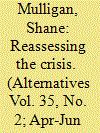

|
|
|
|
|
| Publication |
2010.
|
| Summary/Abstract |
Geopolitics has long been associated with material factors, but theories of international relations continue to evade questions about ecological degradation and declining natural resources. One important point of intersection is the relationship between liberalism and natural abundance/scarcity. There are grounds to suggest that liberal ideas and revolutions owe their emergence and endurance to ecological abundance, particularly in the form of immense stores of solar energy in fossil fuels: such fuels have literally powered the modern liberal project. Some ecological thinkers argue that humanity, or "civilization," is soon to face massive ecological, economic, and social decline as a result of declining resources, but it is difficult to picture just what "collapse" might entail in political terms. This article examines the prospect that what many see as the current decline of liberalism may in fact be a manifestation of ecologically induced collapse, especially due to the limit to growth represented by "peak oil." It concludes with consideration of the merits of a more ecological perspective on our political existence.
|
|
|
|
|
|
|
|
|
|
|
|
|
|
|
|
| 10 |
ID:
134366


|
|
|
|
|
| Summary/Abstract |
The current model of economic growth generated unprecedented increases in human wealth and prosperity during the 19th and 20th centuries. The main mechanisms have been the rapid pace of technological and social innovation, human capital accumulation, and the conversion of resources and natural capital into more valuable forms of produced capital. However, there is evidence emerging that this model may be approaching environmental limits and planetary boundaries, and that the conversion of natural capital needs to slow down rapidly and then be reversed. Some commentators have asserted that in order for this to occur, we will need to stop growing altogether and, instead, seek prosperity without growth. Others argue that environmental concerns are low-priority luxuries to be contemplated once global growth has properly returned to levels observed prior to the 2008 financial crisis. A third group argues that there is no trade-off, and, instead, promotes green growth: the (politically appealing) idea is that we can simultaneously grow and address our environmental problems. This paper provides a critical perspective on this debate and suggests that a substantial research agenda is required to come to grips with these challenges. One place to start is with the relevant metrics: measures of per-capita wealth, and, eventually, quantitative measures of prosperity, alongside a dashboard of other sustainability indicators. A public and political focus on wealth (a stock), and its annual changes, could realistically complement the current focus on market-based gross output as measured by GDP (a flow). This could have important policy implications, but deeper changes to governance and business models will be required.
|
|
|
|
|
|
|
|
|
|
|
|
|
|
|
|
| 11 |
ID:
126822
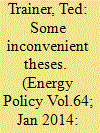

|
|
|
|
|
| Publication |
2014.
|
| Summary/Abstract |
There is a strong tendency for energy technologists and policy analysts to believe that energy demand can be met and associated problems including climate change can be solved, and to focus attention on finding the best technologies to achieve these goals. They tend not to be comfortable with any suggestion that there might be insurmountable limits and insoluble problems, or that the problems they are working on require social solutions rather than technical solutions. Various contributions to this Special Edition provide illustrations. This paper explores some challenges to the dominant Promethian world view. These include a consideration of the magnitude of the energy and other problems, the possibility that renewable energy cannot solve them, the significance of energy and of declining EROI for economic growth, and the possible effects of rising resource input costs and unstable capital markets for energy investment. Finally the ultimate heresy is considered, the possibility that access to abundant energy would not be good for us. In summary, it is suggested that coercive limits to growth are being encountered and that the resulting problems cannot be solved by action on the supply side but will require a radical rethinking of social goals, systems and values.
|
|
|
|
|
|
|
|
|
|
|
|
|
|
|
|
|
|
|
|
|